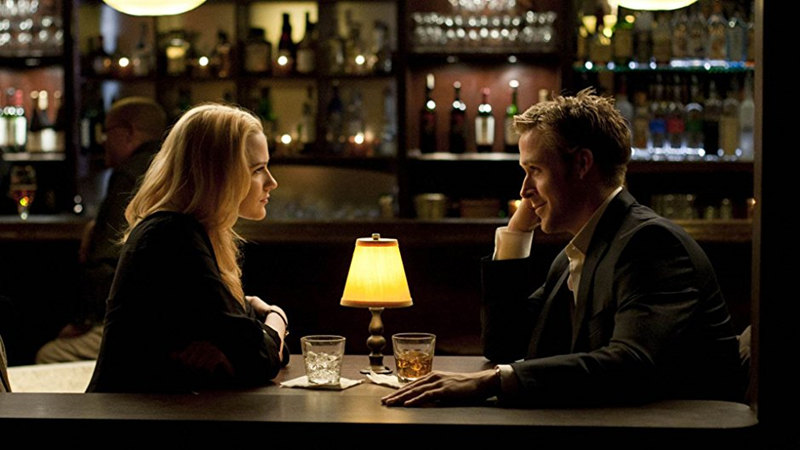In “Only God Forgives,” writer and director Nicolas Winding Refn continues his cage-fight with the boundaries of genre film in his latest, an existential revenge story set in the dark underworld of Bangkok’s drug trade. Ryan Gosling plays Julian, an American ex-pat who runs a boxing club that fronts for a drug operation headed by his state-side mother, Crystal (Kristin Scott Thomas). When his brother Billy is killed for raping and murdering a prostitute, Crystal travels to Bangkok and demands that Julian seek justice by killing the man responsible, a mysterious and powerful figure in black named Chang.
This straightforward description doesn’t begin to touch the disturbing, hallucinatory mystery of Refn’s film, which is steeped in both formal rigor and in more illusive ideas of guilt, divine retribution, and a blood-soaked mysticism. As in his previous film, last year’s Hollywood debut “Drive”, Refn shows little interest in the expected payoffs of standard narrative form, and instead focuses on an intense, heightened reality of visual and color motifs, iconic characterizations and blunt, minimal dialogue (Julian speaks fewer than two dozen lines in the entire film, and Chang even less).
Shooting on location in Bangkok, much of the world Julian moves in is distinctly other-worldly, suffused with eerie neon of red and blue, or on the verge of being swallowed by shadows. The boxing arena is dominated by an enormous red-lit canvas with a stylized tiger face, like a wrathful deity that dwarfs the human presence. A sequence of excessive, excruciating torture takes place in a gay karaoke bar decorated in a style of refined but overblown, flowery kitsch. The female customers are dressed and act like dolls in a display cabinet, frozen and mute even before the horror begins.
In this setting, Gosling’s flat, internalized acting style fits the role of a Westerner in an Eastern world, suffocating in the space inside his own head. Guilty of killing his own father (“with his bare hands” Crystal says, like she’s mouthing a chocolate), Julian is a man beset by the deepest sort of regret. His unexpressed sexual rage and desire for punishment is the spark for his disturbing visions of hands, his mother, and the angel/devil Chang, which are intercut into ‘real life’ scenes with alarming and disorienting effect.
As Chang, Vithaya Pansringarm exerts a dominating presence as the deity-like figure that seems half real, half mythic, an implacable figure of pitiless retribution armed with a mastery of the Kendo sword and Muay Thai fists (and elbows and knees, as Julian discovers). Chang’s exact relationship with ‘official’ channels is only implied, but his aura of coiled, polite lethality hangs on him and the whole film like an invisible cloud, even in the one scene he shares with his young daughter.
With the exception of Crystal, the foul-mouthed outsider, the characters understand this menace, and serve Change with a religious deference. For reasons that only slowly become clear, Julian finds himself seeking out this manifestation, looking for release through the timeless nature of a person and place that stews real-world brutality and mystical transcendence in the same pot. In a performance that slips into self-parody at times, Thomas’ incest-bent, viciously controlling mother stands apart, her boorish profanity and twisted psyche one of the few clanging notes in the film.
“Only God Forgives” refusal to play for conventional genre beats makes for brutal and disturbing viewing, It takes time for the meaning of Julian’s visions to play out, and even then, there is much left mysterious, unspoken. It’s a brew that will undoubtedly strike some as overdone and needlessly artificial. But the tense undercurrent of interior dread and chaos is expertly maintained, despite lapses in the character of Crystal, and Refn’s film sticks around like a burr in your brain long after the credits roll.
Video:
“Only God Forgives” is presented in Widescreen, in a 1.85:1 aspect ratio. The important color schemes and atmospheric lighting look good on this Blu-ray disc, with very little edge blurring or black distortion. The subtitling of the Thai language sequences is white, with good clarity. There are options for English SDH and Spanish subtitles.
Audio:
The audio track is DTS HD Master Audio 5.1. I had occasional problems hearing the low-key dialogue, but Cliff Martinez’s wonderful score throbs and pulses wonderfully.
Extras:
- A commentary track with interviewer Damon Wise and writer/director Nicolas Winding Refn. Refn’s logic is hard to follow at times, but I found this track illuminating, both technically and thematically
- “Talking About Thailand” and “Discussing Genre Films”: two casual, awkwardly filmed interviews with Refn where he discusses shooting in Thailand, filming chronologically, and his approach to genre style.
- “Behind The Scenes”: an interesting, and sometimes funny, series of 12 featurettes shot on set about various details of the filming process, including rehearsing the drug deal scene, the SFX of chopping off an arm, and staging the shoot out.
- “The Music of ‘Only God Forgives’”: composer Cliff Martinez talks about his eclectic, memorable score
Parting thoughts:
Not exactly a date movie (unless your date is Medea), “Only God Forgives” is a memorable mix of symbolism, twisted psychology and violent retribution, and an intriguing follow-up to director Nicolas Winding Refn’s previous film “Drive.”


